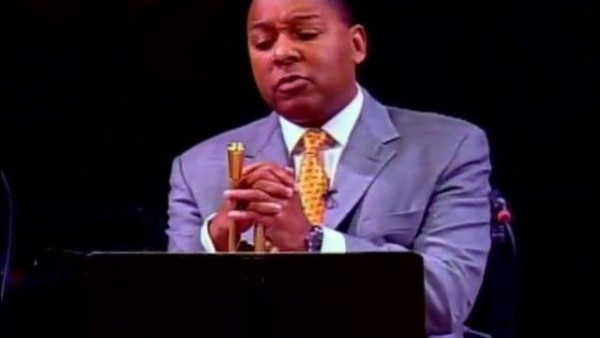Wynton Marsalis Goes to Washington
Even a day later, Wynton Marsalis couldn’t explain why he was crying so hard during the speech he gave last Monday night at the Kennedy Center in Washington, D.C. “Man, I don’t know,” he told me. “I’m not really a person that’s effusive. I’m a quiet type of person. Dick Vermeil“—the notoriously teary ex-NFL coach—“that’s not me.”
The impeccably cool artistic director of Jazz at Lincoln Center had come here to deliver the Nancy Hanks Lecture on Arts and Public Policy. His speech, which he titled “The Ballad of the American Arts,” was a bravura 50-minute survey of how our country has used “homegrown arts to make us into one people, to teach us who we are.” He made surprising connections, praising Ben Franklin and Charlie Parker in turn for being “the living embodiment of down-home sophistication.” And, because he’d brought a quintet and his trumpet along, he added musical illustrations, tracing the progress of “The Battle Hymn of the Republic” through Sousa’s marches to the Mickey Mouse Club theme. “I’m trying to tell you all this stuff was connected before the DNA told you,” he said.
Marsalis’s eloquence and easy humor made his tears at the finale all the greater a surprise. He bowed and cried, and bowed and cried, which made the crowd cheer even more. Though he couldn’t articulate what brought on this emotion, he told me it came from feeling “overwhelmed“—from putting into words the full weight of the tragic, glorious history bound up in our arts, and vice versa: “That’s our life, that’s the life I live, so it started to hit me.”
When someone who thinks about these issues as much as Marsalis does grows so profoundly affected by talking about them, it shows how utterly we fail at discussing culture in America. The champions of the arts speak of them today largely in functional terms: as businesses, or as subjects you teach because they’ll make kids more employable. There’s no doubt these arguments can be apt—last week in D.C., for example. The day after the speech, Americans for the Arts, the advocacy group that hosts the Hanks lecture, sent Marsalis and the singers Josh Groban and Linda Ronstadt to testify before Congress, and 500 activists to lobby their elected officials. Again and again, they described the arts as revenue- and jobgenerating dynamos. I saw one staffer’s eyes widen when he was handed a map of all the arts organizations in his congressman’s district.
Yet amid all the demands for better funding for the arts, hardly anybody addresses the graver shortfall, which is for better thinking about the arts. If more people joined Marsalis in calling for “a new American mythology,” one that granted greater prominence to the arts because they “demand and deserve that we recognize the life we have lived on this land together,” the appropriations would almost certainly follow.
One difficulty, of course, is: who could make this case like Marsalis, even if they tried? When the crowd wouldn’t stop roaring, he brought the band back onstage and, composure regained, led them in a blazing, much more characteristic, encore. Soon his music had 1,300 people clapping in time, which was another way of making his point.
by Jeremy McCarter
Source: Newsweek

